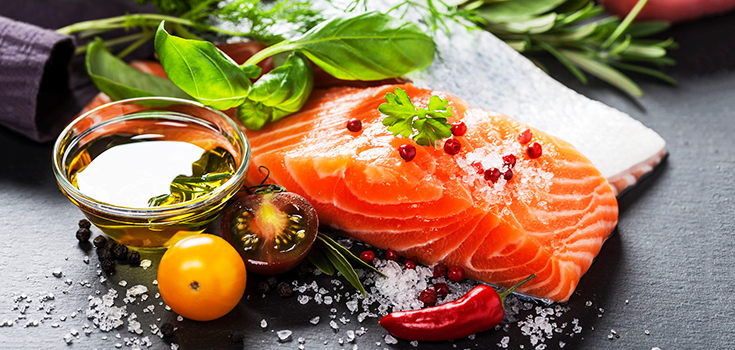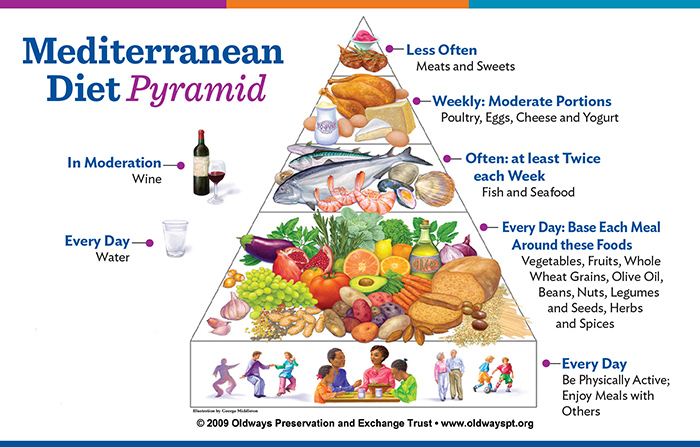Researchers Say This Diet Greatly Protects Against Disease
Researchers Say This Diet Greatly Protects Against Disease
High-Fat Healthy Oils OK as Part of the Mediterranean Diet
The Mediterranean diet is looking more and more appealing these days.
The Mediterranean diet is looking more and more appealing these days. Earlier this month, scientists said that adding a small amount of pasta to your Mediterranean diet wouldn’t help pack unwanted pounds onto your frame. In fact, they said,
Well, dinner might look even more appetizing to people who adhere to this way of eating now that researchers have found that a Mediterranean diet high in healthy fats still offers tremendous health benefits .
The Mediterranean diet emphasizes eating primarily plant-based foods – fruits, vegetables, whole grains, legumes, and nuts. Butter is replaced with healthy fats such as olive oil and canola oil. Rather than using salt to flavor foods, people who eat a Mediterranean diet season their meals with herbs and spices. Red meat consumption is limited to no more than a few times a month , while fish and poultry is eaten at least twice a week. Red wine can be enjoyed in moderation.
In a new meta-analysis published in the Annals of Internal Medicine of previous studies that looked at associations between diet and disease outcomes, researchers found that people who ate a high-fat Mediterranean diet significantly reduced their risk of a number of chronic illnesses .
As long as those fats are healthy fats, the team said, and part of an otherwise healthy, vegetable-rich diet, they don’t have to worry about curbing their fat intake .
Study author Hanna E. Bloomfield, a researcher at the Minneapolis Veterans Affairs Medical Center, said:
“The evidence that we reviewed from the past fifty years or so showed that people who consume a Mediterranean diet with no restriction on fat intake have a lower risk of cardiovascular disease, breast cancer, and type two diabetes.” [2]
Mediterranean Diet Needs At Least 2 of These 7 Patterns
For the meta-analysis, Bloomfield and her team defined a Mediterranean diet as having no limit on fat, but having at least 2 of the 7 following patterns:
1. A high monounsaturated-to-saturated fat ratio 2. Lots of fruits and vegetables 3. High legume intake 4. High grain and cereal consumption 5. Moderate red wine consumption 6. Low consumption of meat/meat products 7. High intake of fish [1]The researchers looked at 56 studies and found no association between the Mediterranean diet and mortality in general; however, the team pointed out that there may not have been enough participants to establish a connection.
There were plenty of links between a high-fat Mediterranean diet and chronic illnesses, however. People who strongly adhered to the diet, regardless of their fat intake, had a 29% reduced risk of heart-related problems , including heart attack, stroke, and heart disease-related death, compared to those who adhered to the diet the least.
The former also had a 57% reduced risk of breast cancer , and a 30% reduced risk of diabetes . [1]
“If you adhere to a Mediterranean diet, you will probably have fewer heart attacks and strokes, and will be less likely to develop breast cancer and less likely to develop diabetes.” [2]
Read: Olive Oil Shown to Drastically Reduce Heart Disease Risk
Previous studies have suggested that the Mediterranean diet might also lower cholesterol (though some studies suggest that it is low cholesterol, not high cholesterol, which is harmful to the heart), help people lose weight and lower blood sugar , among other things.
The Mediterranean diet is also antioxidant-rich , which could also promote better health.
If you’re not already eating a Mediterranean diet, and you’d like to give it a try, Bloomfield said shifting to the diet can be done in steps :
“The main thing I would do is start using only olive oil or canola oil in my kitchen. Eat more chicken and fish and less red meat, and more nuts instead of potato chips.”
Other suggestions include adding more vegetables to dishes; topping cereal, salads, and even meat with fruits; and adding beans to meat dishes or in place of meat.
| About Julie Fidler: | |
| Julie Fidler is a freelance writer, legal blogger, and the author of Adventures in Holy Matrimony: For Better or the Absolute Worst. She lives in Pennsylvania with her husband and two ridiculously spoiled cats. She occasionally pontificates onher blog. | |
Other Popular Stories:


Post a Comment